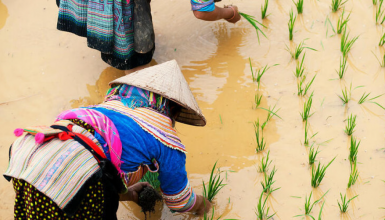
UN Climate Change News, 6 September 2019 – Experts including representatives of indigenous peoples from around the world meeting at a special dialogue at Asia-Pacific Climate Week have stressed the importance of values in the fight against climate change, notably in building long-term resilience to its unavoidable impacts.
Although indigenous peoples constitute less than 5% of the world’s population, they safeguard 80% of the world’s remaining biodiversity, thereby playing a key role in climate protection. Indigenous peoples often have a spiritual connection to nature, which ensures that they take the protection of their habitat seriously.
Jenny Ritchie of Te Herenga Waka Victoria University of Wellington who spoke at a “Resilience Frontiers Dialogue on Indigenous Values for Future Resilience” said: “Our wellbeing is invested in the wellbeing of our environment in both spiritual and physical ways.” She spoke about the Mãori worldview, in which humans, plants, animals, fish and insects share a cosmological relationship. The Mãori are a people in New Zealand who generally share the view that the wellbeing of one depends on the wellbeing of all.
Such common values include indigenous peoples’ holistic view of and symbiotic relationship with Mother Earth – a relationship in which life thrives on the recognition of an inalienable interconnectedness and delicate balance. In Mãori communities, indigenous people grow native seeds and indigenous flora to restore rivers, which in turn enhance the livelihoods of communities that depend on the river systems.
Indigenous peoples also hold a strong sense of responsibility for intergenerational equity – the principle that every generation holds the Earth in common with members of the present generation and with other generations, past and future. Their knowledge and practices are guided by the principle of how one’s action will affect the wellbeing of generations to come.
Such peoples recognize nature as an integral part of their identity. Safeguarding the health of nature is therefore a fundamental way to show respect and protect one’s own health.
The group meeting in Bangkok discussed common indigenous values and how these can be widely applied to advance sustainable socioeconomic development and climate action.
Youssef Nassef, Director of the Adaptation Programme of UN Climate Change, said that “we have to reimagine our values in ways that enable us to achieve future resilience for all,” noting that these indigenous values can help societies to go beyond simply reacting to the symptoms of environmental challenges and help them adopt the mindset necessary to build long-term resilience for all.
The group also noted that societies around the world are already integrating indigenous knowledge and practices into their sustainable development paths in areas spanning development, education, business and legislative measures.
There is also an increasing awareness of the need to update our economic indicators and priorities from GDP growth to focus on society’s well-being.
Researchers in New Zealand are exploring ways to deploy education as a tool to instill indigenous values in younger generations.
Business communities are building on innovative business models based on sustainable natural resource management, such as indigenous beekeeping practices amongst Karen people in Thailand, and traditional herb harvesting in India.
Mãori value systems related to water resource management are now recognized in legislation, known as Te Awa Tupua.
Recent reports of the Intergovernmental Panel on Climate Change (IPCC) and the Intergovernmental Science-Policy Platform on Biodiversity and Ecosystem Services (IPBES) stress the urgent need for transformative change to reverse the impending ecological crisis.
With only a limited window of time to bend the emissions curve, adapting to changing climate conditions, and halt the rapid decline in biodiversity, the values and wisdom of indigenous peoples can help societies achieve this transformation.



